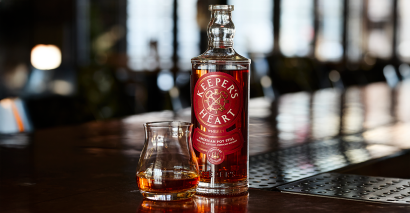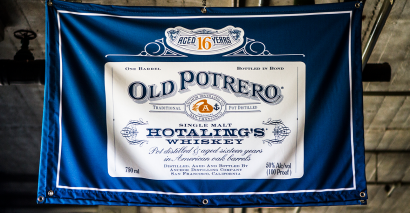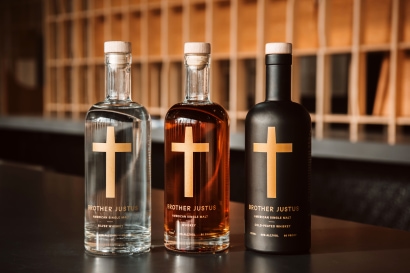
Although the coronavirus pandemic has caused disruptions throughout the whisky industry, distilleries in Kentucky like Heaven Hill (bottling line pictured) are considered essential businesses and are continuing operations, with safety precautions.
Whisky Making Continues Amid COVID-19, But Some Distillers Foresee Problems
April 15, 2020 –––––– Zak Kostro
COVID-19 has hit the whisky industry hard, forcing distilleries of all sizes to adapt to social distancing protocols and other preventative measures. The effects of the virus are being felt worldwide, from Scotland to Kentucky. Most large distillers assert that, even when suspending operations or shifting production capacity to making ethanol for hand sanitizer, the supply of whisky won't be interrupted, and whisky lovers will still be able to find their favorite bottles on store shelves. But others, especially smaller companies, point to supply troubles down the road.In Scotland, many distilleries are still operational, but with new ways of working, according to the Scotch Whisky Association. “Companies are all applying the latest government guidance for those who work in production and operations, applying strict social distancing and comprehensive additional hygiene measures,” the organization wrote in a statement. “All employees who can work from home are doing so.” Additionally, the association has set up an online portal to connect distilleries with organizations in need of hand sanitizer or ethanol for its production.For the time being, however, a number of major scotch distilleries have scaled back operations, including Chivas Brothers, which has also shut down some sites, though a company spokesperson wouldn't confirm which ones. Chivas, which is owned by Pernod Ricard, has 14 distilleries in Scotland. Other scotch distilleries have confirmed shutdowns, including Glenmorangie and Ardbeg. “Our response to COVID-19 started with the introduction of new safety measures and social distancing,” says Glenmorangie Co. president and CEO Thomas Moradpour. “As the situation progressed, we decided to temporarily close the distilleries and the bottling plant [on March 23] until a time when we believe we can operate them safely and in line with government guidance.” Moradpour won't speculate on when precisely that might be, but adds that the shutdowns won't affect availability of the company's whiskies.But a longer-term production shutdown could have significant implications for the broader supply chain, according to the SWA. “UK and EU farmers have now planted barley for harvest later in the year, in anticipation that demand would not be affected,” an SWA spokesperson says. “If the flow of grain stops, there will be significant implications at harvest time, as stocks and storage space for grain are tied up or go unused.”
 Conor O'Driscoll, master distiller at Heaven Hill, says bourbon fans won't have to worry about a shortage of whiskey.
Conor O'Driscoll, master distiller at Heaven Hill, says bourbon fans won't have to worry about a shortage of whiskey.
 Like many distilleries, Kentucky's New Riff has shifted some production to making hand sanitizer, but co-founder and owner Ken Lewis says that the impact on supply of whiskey should be small.
Like many distilleries, Kentucky's New Riff has shifted some production to making hand sanitizer, but co-founder and owner Ken Lewis says that the impact on supply of whiskey should be small.
 Conor O'Driscoll, master distiller at Heaven Hill, says bourbon fans won't have to worry about a shortage of whiskey.
Conor O'Driscoll, master distiller at Heaven Hill, says bourbon fans won't have to worry about a shortage of whiskey.Bourbon's Robust Response
In the U.S., major whiskey distilleries are mostly continuing to work uninterrupted, albeit with new social distancing and safety measures. Many have also dedicated production capacity to making ethanol for hand sanitizer, including Heaven Hill, Jim Beam, and Jack Daniel's, as well as numerous smaller craft distilleries.In Kentucky, Heaven Hill has implemented social distancing protocols, enhanced cleaning measures, and distributed face masks, following guidance from federal, state, and local health officials, master distiller Conor O'Driscoll says. “In terms of American whiskey production, we are continuing as normal under these new health and safety measures,” he adds. “In fact, we've added capacity in order to produce hand sanitizer,” with bulk operations underway at Heaven Hill's Bardstown facility, as well as the company's Deep Eddy vodka distillery in Buda, Texas, and at the Black Velvet whisky distillery in Lethbridge, Canada.O'Driscoll reassures Heaven Hill fans that the whiskey isn't in danger of running out. “Distilled spirits have been declared an essential industry in Kentucky,” he notes. “[This is] vital to sustaining Heaven Hill's—and our industry's—employment and business continuity. While we continue to keep a close eye on our supply chain, we have seen record shipping days over the past several weeks.” Heaven Hill is confident enough to be moving forward on an expansion of its Bourbon Heritage Center in Bardstown, as well its plans to add new barrel warehouses and upgrade bottling lines. “Our industry has faced many unsettling times” over the years, O'Driscoll adds. “We wouldn't want to speculate on future conditions of this situation, but if all holds true to current conditions throughout this pandemic, we will remain stable.”Few U.S. distilleries have suspended operations, although Four Roses did so on March 20. Brown-Forman temporarily shut down its Louisville, Kentucky cooperage on March 30 after two employees tested positive for COVID-19. The cooperage reopened on April 13, after the facility was sanitized and workers cleared “based on guidelines provided by the health department,” Brown-Forman spokeswoman Elizabeth Conway says.Brown-Forman's Jack Daniel Distillery in Lynchburg, Tennessee has carried on production while implementing all guidelines from the Centers for Disease Control and Prevention. “In addition, our production team has staggered shifts and breaks to create further separation among each other,” says distillery vice president and general manager Larry Combs, adding that the distillery is “a very efficient operation, so we are able to implement social distancing and all other safety measures without impacting operations.” Furthermore, thanks to a recent expansion, the distillery has been able to add production of ethanol for hand sanitizer without impacting its normal whiskey operations. “With the steps we have taken, and the resilience and dedication of our employees, there has not been an impact that will affect future supply,” Combs says. “We have enough stock for today, and continue to lay down Jack Daniel's for the future.” Like many distilleries, Kentucky's New Riff has shifted some production to making hand sanitizer, but co-founder and owner Ken Lewis says that the impact on supply of whiskey should be small.
Like many distilleries, Kentucky's New Riff has shifted some production to making hand sanitizer, but co-founder and owner Ken Lewis says that the impact on supply of whiskey should be small.



